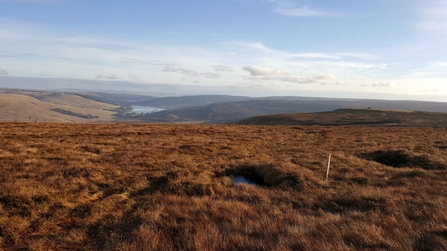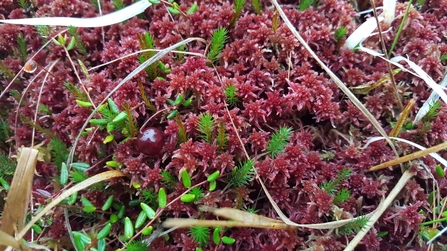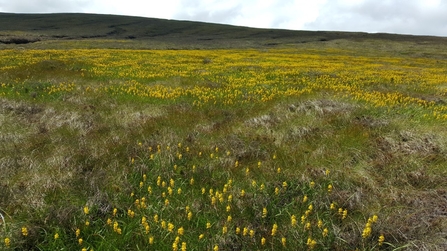
Whitelee Moor. Image by: Geoff Dobbins.

Whitelee Moor. Image by: Geoff Dobbins.
The UK Government has announced its intention to ban the sale of peat to amateur gardeners by 2024.
It is understood that this ban will apply to bagged peat compost, but it not yet clear whether peat-containing products, such as plants, will also be subject to a 2024 ban.
The ban follows a public consultation, which ran from December 2021 to March 2022, and marks the first occasion that any UK government has considered legislative action to tackle the use of peat in horticulture.
The Wildlife Trusts, alongside key nature charities, have campaigned for an end to the needless destruction of one of the UK’s most precious wildlife habitats since the 1990s.
Peatlands have a global cooling effect when they are in their naturally wet state, and lock away carbon from dead plants for hundreds or even thousands of years. However, when peatlands are drained and dug up for use in gardens and greenhouses, stored carbon is released in the form of CO2 (carbon dioxide).
The Wildlife Trusts estimate that peat extraction for horticulture has caused up to 31 million tonnes of CO2 to be released since 1990
In the run up to COP15, the UN Biodiversity Conference due to take place later this year, the UK Government led with ambitious calls to protect nature, including putting an end to biodiversity loss globally, and protecting at least 30% of land and seas, by 2030.
Following the announcement, the UK Government is in a stronger position to push for ambitious negotiations at COP15.

Hummel knowe sphagnum capillifolium at Whitelee Moor. Image by: Geoff Dobbins.
In this region, Northumberland Wildlife Trust has been working tirelessly to protect the region’s peatlands. One of the earliest and longest-running projects of its kind in the country is The Border Mires peatland restoration project, on which the Trust has collaborated with several partners over the last 50-years. Under the umbrella of the recently established Northumberland Peat Partnership we are scaling up efforts in the county and now have a dedicated peat team to assess and plan peatland restoration.
Peat bogs blanket vast swathes of our Northumberland uplands and are also found in some lowland areas as raised mires. Peat is a vital and special resource. These are not only wonderful places for people to walk and enjoy but are home to a very special range of amazing and internationally important plants and animal. The benefits of healthy peatland function not only extends to biodiversity, climate mitigation and water quality, but also aids flood mitigation, prevents erosion, manages fire risk and is a unique archive of the region’s cultural past.
Heinz Traut Northumberland Peat Partnership Programme Manager says:
“It is fantastic to see tangible progress on this critical issue after decades of campaigning Using peat for gardens from sensitive peatland ecosystems is simply destructive. Extracting peat disrupts the delicate hydrological balance of peatlands and consequently: exposes and dries the peat surface, this releases carbon and alters the floral composition (if not left entirely bare), which consequentially impacts a large number of species that are associated with peatlands, species that are geographically restricted, rare and in some cases declining and threatened.
“Nearly three million cubic metres of peat are sold for horticultural use every year in the UK! S so what we need to see now is the Government taking action towards a total ban on peat extraction and its use in horticulture - only then can we put an end to the decline of peatlands both in the UK and further afield.
“It is also worth noting that only around 20% of peatlands in the UK remain in a near-natural state. The remaining 80% have been modified as a result of past and present management.”
Some uses of peat will remain legal beyond 2024, and so it is important to recognise that while Defra’s proposed ban targets a chunk of the UK peat market, it does not eliminate peat use entirely, nor does it directly address the issue of peat extraction.

Bog asphodel (narthesium ossifragum) at Whitelee Moor. Image by: Geoff Dobbins.
The Wildlife Trusts are calling upon the UK Government to:
The importance of peatlands to our natural world has been understood for decades, and awareness of the issues this special habitat faces has only increased. The announcement from Defra symbolises long-awaited, decisive action which will help to reverse species decline and to address the fact that a huge 4% of the UK’s total annual greenhouse gas emissions now come from degraded peatlands.
The decision also sends a clear signal to growers and retailers that it is time to change. After target dates for the voluntary phase-out of peat were repeatedly missed, plans for a ban were first outlined by the UK Government in 2021. Retailers now have until 2024 to phase out the sale of peat ahead of the Government mandate.
All 46 UK wildlife trusts have campaigned tirelessly on this issue for years - and welcome the news. However, ambition must be increased in order to bring about an end to all uses of peat -with no exemptions. In doing so, the UK Government has the opportunity to embolden other nations to do the same and to demonstrate global leadership on nature and climate.